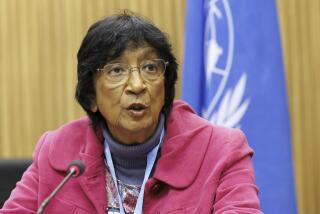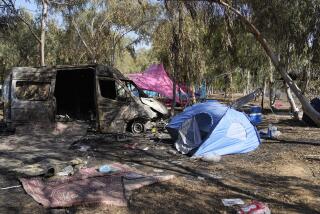Abuse by U.N. Troops Entrenched
- Share via
UNITED NATIONS — In the months he had been in charge of rooting out sexual abuse by U.N. peacekeepers, Prince Zeid Raad Hussein of Jordan thought the organization was getting a handle on the problem. But on the same day this year that the United Nations’ top peacekeeping official and the head of Congo’s U.N. mission were visiting the eastern town of Bunia, a soldier raped a girl “practically within earshot” of the two senior officials, he said.
“I thought to myself, ‘My God, what would it take for that man not to do it?’ ” Zeid recalled.
That question is haunting the United Nations and the traumatized populations the soldiers are supposed to safeguard as countries rebuild from war.
Despite a raft of new policies instituted since widespread abuses by peacekeepers in Congo made headlines last year, rape and sexual exploitation continue in U.N. outposts around the world, according to a report released Tuesday by the Washington-based advocacy organization Refugees International.
A “hyper-masculine” culture and a tradition of silence among peacekeepers are making it more difficult than U.N. officials expected to halt soldiers’ sexual exploitation of the people they are charged with protecting, the report said.
Instead, the soldiers are protecting one another, providing alibis for their fellow troops and making death threats against investigators, the report said.
Extensive training and a strict code of conduct have made few inroads into the “boys will be boys” culture among U.N. soldiers, said the report, based on interviews with U.N. troops and staff members, plus local residents, in six countries.
Last year, the U.N. instituted a policy of “zero contact,” barring any interaction between civilians and U.N. soldiers in Congo, and newly arriving troops are warned that they could be sent home if they break the rules. U.N. Codes of Conduct are posted in barracks and U.N. offices.
“No one can say they don’t know what the standards were,” said Anna Shotton, a U.N. peacekeeping official who has been driving the organization’s efforts to address the problem and cooperated with the report.
In the last year, U.N. investigators have completed inquiries into 221 complaints in Congo; repatriated 88 soldiers, including six commanders; and fired 10 civilian staffers, Shotton said.
But beyond deporting soldiers or firing civilian officials, there is little the U.N. can do to punish violators. The United Nations is not a sovereign entity, so it must depend on the countries that supply the troops or staffers to prosecute them. They often don’t.
Zeid said he was pushing for more stringent deterrents, such as on-site courts-martial to show local populations and U.N. soldiers what happens to violators; formal pledges from troop-contributing countries to prosecute cases; and compensation for victims.
He also said there should be more recreation alternatives for soldiers, such as sports centers or community-building projects.
The report suggests that the United Nations needs more female troops and staff members, and resources to provide more choices for women to earn a living in societies recovering from war. It also calls for clearer procedures for complaints and compensation.
But retired peacekeeping officials say there have been abuses as long as there have been soldiers.
Part of the problem is proximity: Until last year in Bunia, for instance, peacekeepers’ barracks were located next to a refugee camp, giving rise to a queasy commerce between soldiers and war victims so desperate they would have sex for a dollar or a piece of bread.
The U.N. has promulgated new rules after previous scandals, such as one in 2001 in which Bosnian policemen were found to be helping to traffic women to work as prostitutes, or another in 2002 in West Africa, where relief supplies were traded for sex. But they have wrought little permanent change.
This time, a team of U.N. officials and nongovernmental organizations is trying to dismantle both the structures and the attitudes that breed the abuse. Now in Bunia, the barracks are far away, and many of the bars and restaurants where soldiers would meet women are off-limits.
Sarah Martin, the author of the report, said that in her trips to 11 countries, the comments she heard from United Nations troops revealed how entrenched attitudes were, and how difficult they could be to change: It’s not rape if the woman is a prostitute. The women pound on our doors and solicit us. The women can use their bodies how they want. Why ruin someone’s career just for having sex? Boys will be boys.
“People need to understand why it is important not to take advantage of a population traumatized by conflict,” Martin said.
Until they do, “the zero-tolerance policy does not make sense to them, and the problems will go on.”
More to Read
Sign up for Essential California
The most important California stories and recommendations in your inbox every morning.
You may occasionally receive promotional content from the Los Angeles Times.













